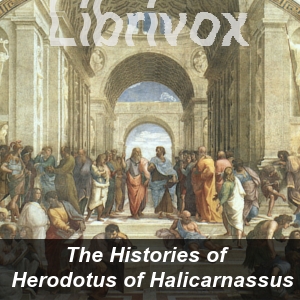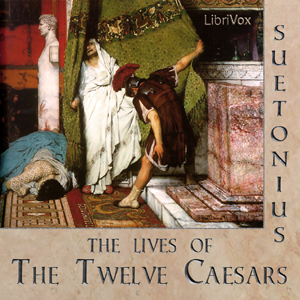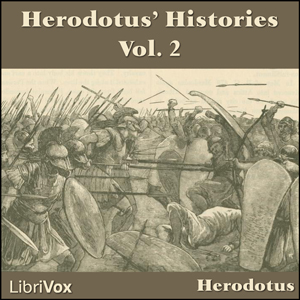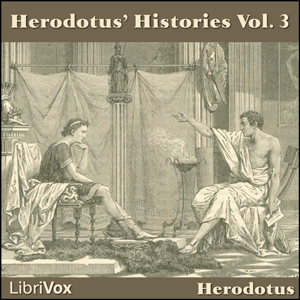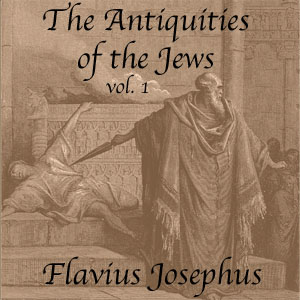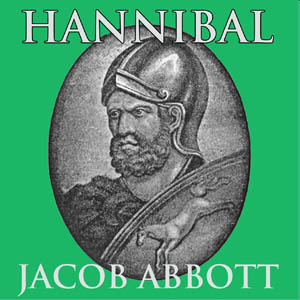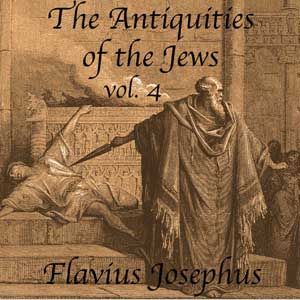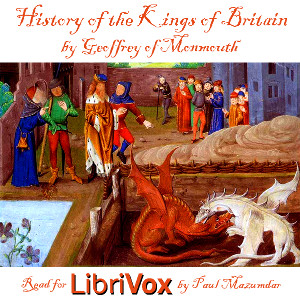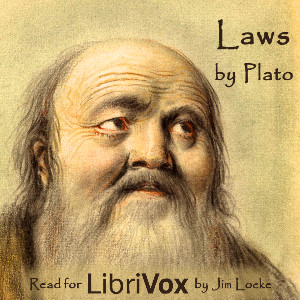Rabbi Louis Ginzberg was one of the outstanding Talmudists of the twentieth century. He was born on November 28, 1873, in Kovno, Lithuania; he died on November 11, 1953, in New York City. Ginzberg taught at the Jewish Theological seminary from 1903 to 1953. For 50 years, he trained two generations of Conservative Rabbis.The Legends of the Jews is an epic 7-volume compilation of traditional Jewish stories loosely related to the Bible. Over the millenia, these stories, which expand on the Bible, flesh out the lives of biblical figures. In the process, they help bring to life the Bible's valuable lessons.The Legends of the Jews has been called a monumental work of scholarship. It is studied by serious students of both Judaism and Christianity. And yet the stories continue to be accessible and understood by all. They were designed to impart lessons of the Torah, and any child or adult will find much to enjoy about this work.(Summary by Scott Sherris and Wikipedia)
42 episodes
Thomas D'Arcy McGee was an Irish refugee and a father of the Canadian confederation. His work on Irish history is comprehensive, encompassing twelve books; Book 1 begins with the earliest modern settlement of Ireland and ends with the 8th century. (Summary by Sibella Denton)
9 episodes
The Annals was Tacitus' final work, covering the period from the death of Augustus Caesar in the year 14. He wrote at least 16 books, but books 7-10 and parts of books 5, 6, 11 and 16 are missing. Book 6 ends with the death of Tiberius and books 7-12 presumably covered the reigns of Caligula and Claudius. The remaining books cover the reign of Nero, perhaps until his death in June 68 or until the end of that year, to connect with the Histories. The second half of book 16 is missing, ending with the events of the year 66. We do not know whether Tacitus completed the work or whether he finished the other works that he had planned to write; he died before he could complete his planned histories of Nerva and Trajan, and no record survives of the work on Augustus Caesar and the beginnings of the Empire with which he had planned to complete his work as an historian. (Summary from Wikipedia.)
8 episodes
The Histories of Herodotus of Halicarnassus is considered the first work of history in Western literature. Written about 440 BC, the Histories tell the story of the war between the Persian Empire and the Greek city-states in the 5th century BC. Herodotus traveled extensively around the ancient world, conducting interviews and collecting stories for his book. The rise of the Persian Empire is chronicled, and the causes for the conflict with Greece. Herodotus treats the conflict as an ideological one, frequently contrasting the absolute power of the Persian king with the democratic government of the Greeks. (Summary adapted from Wikipedia.)
26 episodes
The Annals was Tacitus' final work, covering the period from the death of Augustus Caesar in the year 14. He wrote at least 16 books, but books 7-10 and parts of books 5, 6, 11 and 16 are missing. Book 6 ends with the death of Tiberius and books 7-12 presumably covered the reigns of Caligula and Claudius. The remaining books cover the reign of Nero, perhaps until his death in June 68 or until the end of that year, to connect with the Histories. The second half of book 16 is missing, ending with the events of the year 66. We do not know whether Tacitus completed the work or whether he finished the other works that he had planned to write; he died before he could complete his planned histories of Nerva and Trajan, and no record survives of the work on Augustus Caesar and the beginnings of the Empire with which he had planned to complete his work as an historian. (Summary from Wikipedia.)
12 episodes
The Twelve Caesars is a set of twelve biographies of Julius Caesar and the first 11 emperors of the Roman Empire. The work was written in 121 during the reign of the emperor Hadrian, while Suetonius was Hadrian's personal secretary. On the Life of the Caesars concentrates on the acts and personalities of the Julio-Claudians and their immediate successors. Together with Tacitus' Annals, this work is a major source for the historical details in Robert Graves' novels "I Claudius" and "Claudius the God". (Summary adapted from Wikipedia by Karen Merline.)
39 episodes
The Histories of Herodotus of Halicarnassus is considered the first work of history in Western literature. Written about 440 BC, the Histories tell the story of the war between the Persian Empire and the Greek city-states in the 5th century BC. Herodotus traveled extensively around the ancient world, conducting interviews and collecting stories for his book. The rise of the Persian Empire is chronicled, and the causes for the conflict with Greece. Herodotus treats the conflict as an ideological one, frequently contrasting the absolute power of the Persian king with the democratic government of the Greeks. (Summary adapted from Wikipedia.)
19 episodes
The Histories was written between 110 and 100 B.C. It covered the Year of Four Emperors following the downfall of Nero, the rise of Vespasian, and the rule of the Flavian Dynasty up to the death of Domitian.
Only the first four books and 26 chapters of the fifth book have survived, covering the year 69 and the first part of 70. The work is believed to have continued up to the death of Domitian on September 18, 96. As a prelude to the account of Titus's suppression of the Great Jewish Revolt, Book 5 features a short ethnographic survey of the ancient Jews as seen from the Roman point of view. (Summary adapted from Wikipedia.)
22 episodes
The Annals was Tacitus' final work, covering the period from the death of Augustus Caesar in the year 14. He wrote at least 16 books, but books 7-10 and parts of books 5, 6, 11 and 16 are missing. Book 6 ends with the death of Tiberius and books 7-12 presumably covered the reigns of Caligula and Claudius. The remaining books cover the reign of Nero, perhaps until his death in June 68 or until the end of that year, to connect with the Histories. The second half of book 16 is missing, ending with the events of the year 66. We do not know whether Tacitus completed the work or whether he finished the other works that he had planned to write; he died before he could complete his planned histories of Nerva and Trajan, and no record survives of the work on Augustus Caesar and the beginnings of the Empire with which he had planned to complete his work as an historian. (Summary from Wikipedia.)
19 episodes
The Wars of the Jews (or The History of the Destruction of Jerusalem, or as it usually appears in modern English translations, The Jewish War - original title: Phlauiou Iôsêpou historia Ioudaïkou polemou pros Rhômaious bibliona) is a book written by the 1st century Jewish historian Josephus.
It is a description of Jewish history from the capture of Jerusalem by the Seleucid ruler Antiochus IV Epiphanes in 164 BC to the fall and destruction of Jerusalem in the First Jewish-Roman War in AD 70. The book was written about 75, originally in Josephus's "paternal tongue", probably Aramaic, though this version has not survived. It was later translated into Greek, probably under the supervision of Josephus himself.
The sources of knowledge that we have of this war are Josephus's account and from the Talmud (gittin 57b) and in midrash Eichah. (Summary by Wikipedia)
72 episodes
A Short History of Scotland is a consise introduction to the history of Scotland from Roman times to the last Jacobite rebellion, written by the author of a much longer Scottish history. (Summary by Sibella Denton.)
54 episodes
The Histories of Herodotus of Halicarnassus is considered the first work of history in Western literature. Written about 440 BC, the Histories tell the story of the war between the Persian Empire and the Greek city-states in the 5th century BC. Herodotus traveled extensively around the ancient world, conducting interviews and collecting stories for his book. The rise of the Persian Empire is chronicled, and the causes for the conflict with Greece. Herodotus treats the conflict as an ideological one, frequently contrasting the absolute power of the Persian king with the democratic government of the Greeks. (Summary adapted from Wikipedia.)
22 episodes
The Agricola (Latin: De vita et moribus Iulii Agricolae, lit. On the life and character of Julius Agricola) is a book by the Roman historian Tacitus, written c 98, which recounts the life of his father-in-law Gnaeus Julius Agricola, an eminent Roman general. It also covers, briefly, the geography and ethnography of ancient Britain. As in the Germania, Tacitus favorably contrasts the liberty of the native Britons to the corruption and tyranny of the Empire; the book also contains eloquent and vicious polemics against the rapacity and greed of Rome. This translation by Alfred John Church and William Jackson Brodribb, was first published in 1877. (Summary from Wikipedia.)
4 episodes

The Germania (Latin: De Origine et situ Germanorum, literally The Origin and Situation of the Germans), written by Gaius Cornelius Tacitus around 98, is an ethnographic work on the Germanic tribes outside the Roman Empire. Germania fits squarely within the tradition established by authors from Herodotus to Julius Caesar. Tacitus himself had already written a similar essay on the lands and tribes of Britannia in his Agricola. The Germania begins with a description of the lands, laws, and customs of the Germanic people; it then segues into descriptions of individual tribes, beginning with those dwelling closest to Roman lands and ending on the uttermost shores of the Baltic, among the amber-gathering Aesti, the primitive and savage Fenni, and the unknown tribes beyond them.
Tacitus’ descriptions of the Germanic character are at times favorable in contrast to the opinions of the Romans of his day. He holds the strict monogamy and chastity of Germanic marriage customs worthy of the highest praise, in contrast to what he saw as the vice and immorality rampant in Roman society of his day, and he admires their open hospitality, their simplicity, and their bravery in battle. One should not, however, think that Tacitus’ portrayal of Germanic customs is entirely favorable; he notes a tendency in the Germanic people for what he saw as their habitual drunkenness, laziness, and barbarism, among other traits. Tacitus says that physically, the Germans appeared to be a distinct race, not an admixture of their neighbors. In Chapter 4, he mentions that they have common characteristics of blue eyes, blond or reddish hair and large size.
In Chapter 7, Tacitus describes their government and leadership as somewhat merit-based and egalitarian, with leadership by example rather than authority and that punishments are carried out by the priests. He mentions that the opinions of women are given respect. In Chapter 9, Tacitus describes a form of folk assembly rather similar to the public Things recorded in later Germanic sources: in these public deliberations, the final decision rests with the men of the tribe as a whole.
Tacitus further discusses the role of women in Chapters 7 and 8, mentioning that they often accompany the men to battle and offer encouragement. He says that the men are often motivated to fight for the women because of an extreme fear of their being taken captive. Tacitus says that the Germans are mainly content with one wife, except for a few political marriages, and specifically and explicitly compares this practice favorably to other barbarian cultures, perhaps since monogamy was a shared value between Roman and Germanic cultures. He also records that adultery is very rare, and that an adulterous woman is shunned afterward by the community regardless of her beauty.
This translation by Alfred John Church and William Jackson Brodribb, was first published in 1877. (Summary from Wikipedia.)
3 episodes
On Architecture is a treatise on architecture written by the Roman architect Vitruvius and dedicated to his patron, the emperor Caesar Augustus as a guide for building projects. The work is one of the most important sources of modern knowledge of Roman building methods as well as the planning and design of structures, both large (aqueducts, buildings, baths, harbours) and small (machines, measuring devices, instruments). He is also the prime source of the famous story of Archimedes and his bath-time discovery. (Summary from Wikipedia)
39 episodes
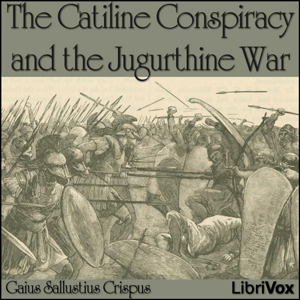
The Catiline Conspiracy and the Jugurthine War are the two separate surviving works of the historian commonly known as "Sallust". Nearly contemporary to the events he describes, he is supposed to have been a retired officer of Caesar's army.
"Catiline" contains the history of the memorable year 63. Sallust describes Catiline as the deliberate foe of law, order and morality (although party politics may have influenced his view). Still, Sallust does recount Catiline's noble traits, including his courage in the final battle. There is doubt among historians about whether Caesar was involved in the conspiracy; several of Catiline's adherents who survived later joined Caesar's side in his was against Pompey. The difficulty of Cicero's position is thoroughly treated.
"Jugurthine War" records the war in Numidia c.112 B.C. This war, which introduces the rivals Marius and Sulla to the Roman political scene, recounts the downfall and capture of the Numidian King Jugurtha. There is an exciting description of an agile Ligurian agent of the Roman side entering a besieged enemy city. (Summary adapted from Wikipedia by Karen Merline)
21 episodes
Antiquities of the Jews was a work published by the important Jewish historian Flavius Josephus about the year 93 or 94. It is a history of the Jewish people, written in Greek for Josephus' gentile patrons. Beginning with the creation of Adam and Eve, it follows the events of the historical books of the Hebrew Bible, but sometimes omits or adds information. (Summary by Wikipedia)
Volume 1 contains Books 1-5 and ends with the dedication of Samuel and death of Eli the priest.
37 episodes
There are certain names which are familiar, as names, to all mankind; and every person who seeks for any degree of mental cultivation, feels desirous of informing himself of the leading outlines of their history, that he may know, in brief, what it was in their characters or their doings which has given them so widely-extended a fame. Consequently, great historical names alone are selected; and it has been the writer's aim to present the prominent and leading traits in their characters, and all the important events in their lives, in a bold and free manner, and yet in the plain and simple language which is so obviously required in works which aim at permanent and practical usefulness. This volume is dedicated to Hannibal. (Summary from the preface of the book)
13 episodes
Book I of the "Story of the World" series. Focuses on the civilizations surrounding the Mediterranean Sea from the time of Abraham to the birth of Christ. Brief histories of the Ancient Israelites, Phoenicians, Egyptians, Scythians, Persians, Greeks, and Romans are given, concluding with the conquest of the entire Mediterranean by Rome. Important myths and legends that preceded recorded history are also related. Ages 9-18 (Summary from the Baldwin Project)
54 episodes
Antiquities of the Jews was a work published by the important Jewish historian Flavius Josephus about the year 93 or 94. Antiquities of the Jews is a history of the Jewish people, written in Greek for Josephus' gentile patrons. Beginning with the creation of Adam and Eve, it follows the events of the historical books of the Hebrew Bible, but sometimes omits or adds information. (Summary by Wikipedia)
Volume 2 contains Books 6-10; it begins right after the death of Eli the priest and the capture of the Ark and ends with the prophecies of Daniel in Persia.
39 episodes
Antiquities of the Jews was a work published by the important Jewish historian Flavius Josephus about the year 93 or 94. Antiquities of the Jews is a history of the Jewish people, written in Greek for Josephus' gentile patrons. Beginning with the creation of Adam and Eve, it follows the events of the historical books of the Hebrew Bible, but sometimes omits or adds information. (Summary by Wikipedia)
Volume 3 contains Books 11-15; it begins with the return of the Babylonian exiles under Cyrus, king of Persia and ends with King Herod rebuilding the temple (c. 559 BC - 20 BC).
34 episodes
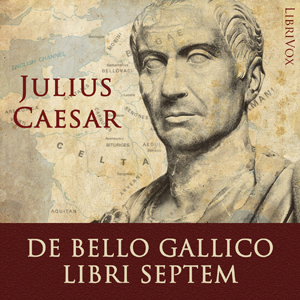
In this book the famous Gaius Julius Caesar himself describes the seven years of his war in Gaul.
When Caesar got proconsul of Gallia and Illyria in 58 B.C, the conquest of land in Gaul was an urgent need, both to improve his political standing and to calm his creditors in Rome. So Caesar claims his interest for a very large area already in the first sentence.
His steps and measures always appear clear and logical, but this simplicity is the result of a strict discipline in style. Caesar really chooses his words, and the list of standard words that he never or rarely uses, is astonishing. E.g. for "river" he only uses flumen and never fluvius or amnis. He avoids porro (furthermore), which would be no decided beginning of a sentence, and in his writings never occurs the word clades (the defeat), although this would normally be demanded by the context.
It is remarkable, that still today in all the lands of his conquest the word for "peace" is derived from latin pax (even basque "bake"). This peace is no friendship between equals, which is the idea behind the German word "Friede". Pax Romana implies subordination, and this concept was promoted by Caesar, first abroad and then at home.
(Summary by Marilianus)
25 episodes
Antiquities of the Jews was a work published by the important Jewish historian Flavius Josephus about the year 93 or 94. Antiquities of the Jews is a history of the Jewish people, written in Greek for Josephus' gentile patrons. Beginning with the creation of Adam and Eve, it follows the events of the historical books of the Hebrew Bible, but sometimes omits or adds information. (Summary by Wikipedia)
Volume 4 contains Books 16-20; it begins with King Herod finishing the temple and ends with the beginning of the Jewish revolt against Nero (c. 20 BC - 66 AD).
29 episodes
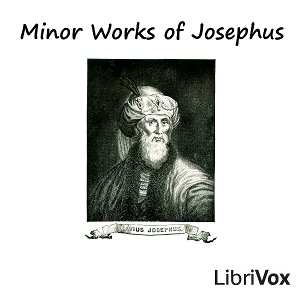
There are 3 parts to this collection.
(1) Against Apion is a two-volume defence of Judaism as classical religion and philosophy, stressing its antiquity, as opposed to what Josephus claimed was the relatively more recent tradition of the Greeks. Some anti-Judean allegations ascribed by Josephus to the Greek writer Apion, and myths accredited to Manetho are also addressed.
(2) Discourse To The Greeks Concerning Hades describes the author's views on the afterlife against the prevailing view of the "Greeks" (i.e., the Greco-Romans) of his day. Although generally still reprinted in editions of Whiston's Josephus, later scholars have realized that this attribution is incorrect. This brief discourse, at least in its original form, is now attributed to the church father Hippolytus.
(3) The Life of Josephus is an autobiographical text written by Josephus in approximately 94-99 CE – possibly as an appendix to his Antiquities of the Jews – where the author for the most part re-visits the events of the War, apparently in response to allegations made against him by Justus of Tiberias. (Summary from Wikipedia)
22 episodes
The 7 Wonders of the Ancient World is a list of masterpieces of architecture and art of classical antiquity. First compiled in the second century BC, it served as a guidebook for the interested Hellenic traveller. This small book gives an introduction to all the entries on the list: The Pyramid of Khufu, the Walls of Babylon, the Satue of the Olympian Zeus, the Temple of Diana (or Artemis), the Tomb of King Mausolus, the Colossus of Rhodes, and the Pharos of Alexandria. Sadly for the modern tourist, all but the Pyramid of Giza have been destroyed centuries ago. (Summary by Availle.)
8 episodes
Las Historias de Heródoto de Halicarnaso (484–después del 430 a. C.) es una obra que tiene como objetivo narrar las Guerras Médicas. Se trata de la primera obra historiográfica griega que nos ha llegado íntegra y está dividida en nueve libros, cada uno de ellos dedicado a una musa. El Libro III contine: Causas que indujeron a Cambises a atacar Egipto. Campaña militar. Detalles acerca del carácter soberbio e impío de Cambises. Muerte de Cambises y entronización de Darío I. Las Historias de Heródoto constituyen, dentro de la prosa griega, el mejor ejemplo de composición literaria abierta; es decir, no opera de modo rectilíneo, sino que intercala todo tipo de retardaciones y digresiones en el argumento central. Este rasgo lo comparte con la Ilíada. - Summary by Wikipedia
16 episodes
More medieval romance than history, Geoffrey of Monmouth's Historia Regum Britanniae represents the oldest versions we have of many legends of Britain, populated by such characters as the Leir, Cymbeline, Uther and Arthur Pendragon and Cadwallader. This is Giles' 1848 revision of Thompson's 1718 edition. - Summary by SkyRider
23 episodes
Thukydides beschrieb den Peloponnesischen Krieg (431 bis 404 v. Chr.) zwischen dem von Athen geführten Attischen Seebund und dem Peloponnesischen Bund unter Sparta bis zum Jahr 411 v. Chr. Er bemühte sich um eine genaue Ermittelung der Tatsachen und wertfreie Darstellung von Ursachen und Wirkungen. Daher gilt er als Begründer einer objektiven Geschichtswissenschaft. Bemerkenswert sind seine Ansichten über die menschliche Natur. (Zusammenfassung von redaer)Internet Archive: weitere gemeinfreie redaer Aufnahmen
81 episodes
This volume contains the four speeches delivered by Cicero in 63 BC, when he was a consul, against the conspiracy headed by L. Sergius Catilina. Catilina was scheming to bring about a general uprising in the country if he could not rise to a position of power by election. This volume includes an English introduction and notes on the speeches by E.A. Upcott.The e-text used to produce this audiobook also includes further helpful study material for Latin scholars, which has been omitted from this audio version. - Summary by Carolin
7 episodes
Laws (Greek: Νόμοι) is Plato's last and longest dialogue. It is generally agreed that Plato wrote this dialogue as an older man, having failed in his effort in Syracuse on the island of Sicily to guide a tyrant's rule, instead having been thrown in prison. - Summary by Wikipedia
37 episodes
Volume 4 discusses some of the key leaders of the ancient world, including Julius Caesar, Marcus Aurelius and Constantine, as well as important religious figures such as Saint Ambrose and Saint Augustine. Summary by KHand
20 episodes
Escrito para la enseñanza en el Instituto Nacional, este compendio comprende la literatura antigua del Oriente y la literatura griega hasta el siglo IV de nuestra era. (Summary by Tux)
23 episodes
This is the first volume in the ten volume collection of the world's most famous orations, as compiled by William Jennings Bryant and Francis Whiting Halsey. The first volume concerns ancient Greece, and contains such famous persons as Achilles, Pericles, and Socrates, with their most famous (legendary or traditional) orations and speeches. - Summary by Carolin
27 episodes
A detailed and exhaustive history of the Norwegian People, written in two volumes. The author, Knut Gjerset, was born in Western Norway in 1865 and immigrated to Chippewa County, Minnesota, in the US with his parents in 1871 and his brother Oluf later got elected to public office there. He received a B.A. in Literature from the University of Minnesota, and also studied at John's Hopkins University from 1895-1896, and the University of Heidelberg, where he was awarded a PhD, from 1896-1898. This first volume deals with the Norwegian History from the earliest times, to the early 14th century and covers topics such as: Prehistoric Norway and iron and Bronze age cultures in the area, the Viking era, The Christianization of Norway and some related information on Iceland, the Faroe Islands, Shetland/Orkney Islands, etc., Early kings of Norway, Norway in the Crusades, and foreign policy reformations at the beginning of the Late Middle Ages. - Summary by Ærik Bjørnsson
75 episodes
This book provides the history of one of the most renowned emperors of all time. The Great Khan. This was a man born Temujin to a clan leader father who was later poisoned. The family was left unprotected and without power to fend for themselves on the Eurasian Steppe. Genghis later rose to power and founded the Mongol Empire, one of the largest in all of history. Despite his great achievement and ferocious reputation there is much we do not know of him, even what he looked like. Historians state that there is not a single portrait of the man that survives to the present day. All current renditions are done after his death by people who never knew him. His death is recorded and his entombment discussed...but all remains to be found. Summary by afutterer
25 episodes
In 1906, William Jennings Bryan, himself a famous American orator, and Francis Whiting Halsey compiled a series of the most famous orations of all time. They are ordered by both geographic area and time period, ranging from Ancient Greece to their contemporary United States. This is the second volume in this series, in which the most famous speeches of great Roman statesmen are collected, including Cicero, Seneca, and Julius Caesar. - Summary by Carolin
29 episodes

Muere Darío haciendo contra la Grecia aprestos militares que continua su hijo Jerges: con este objeto hace abrir un canal en el Athos y echar un puente sobre el Helesponto. — Orden de marcha del ejercito persa de mar y tierra; su número y aumento; naciones que lo componian, y generales encargados del mando. — Disputa de Jerges con el lacedemonio Demarato acerca del valor y resistencia de los Griegos. — Pasa revista Jerges á su ejército en Dorisco y sepone en marcha. — Envían los Lacedemonios á Jerges dos heraldos en compensación de los que ellos habían muerto. — Prepáranse los Atenienses á resistir, á pesar de los infaustos oráculos de Delfos. — Los Argivos se niegan á entrar en la confederación de los Griegos, y Gelon, tirano de Sicilia, lo rehúsa igualmente si no se le da el mando. — Los isleños de Corfú tratan de alucinar con promesas á los embajadores, y los de Creta rehúsan también entrar en la confederación. — Abandonan los Griegos la defensa del paso del Olimpo, y se deciden á defender las Termópilas. — Número prodigioso de hombres que componían el ejercito persa de mar y tierra. — Tempestad que sufre su escuadra. — Ataque de las Termópilas y muerte de Leónidas con
los Espartanos. — Decide Jerges continuar su marcha, y avanza contra la Grecia despreciando los consejos de Demarato.
24 episodes

Reseña de la armada griega reunida en Artemisio, donde atacada por la de Jerges, y despues de dos combates se re tira hácia Salamina. — Conducen los Tesalos a los Persas contra laFocida: origen de las reyertas entre los Tesalos y Focenses. — Avanza Jerges dividiendo su ejercito, pero la columna quedebia saquear á Delfos huye á vista de los pro digios que le suceden. — Los Atenienses abandonan su ciudad, embarcándose para Salamina: aumento de la escuadra griega. — Jerges se apodera de Atenas y su ciudadela, incendiándola. — Temistocles persuade á los Griegos á dar la batalla en Salamina. — Convoca Jerges á los jefes de marina para oir su dictámen, y Artemisa se opone á que se ataque á los Griegos. — Las tropas coligadas del Peloponeso fortifican el istmo contra el cual se dirige el ejercito Persa, y los de la escuadrase empeñan en abandonará Salamina: proyecto que combate Temfstocles. Astucia de este para obligar á los Griegos á pelear en Salamina: descripcion de aquella batalla naval. — Temor de Jerges y su retirada A
Reseña Persia, dejando á Mardonio con trescientos mil hombres. — Politica de Temistocles. — Alejandro de Macedonia es en viado por Mardonio de emba]ador á los Atenienses para atraerlos á su alianza, que rehusan ellos. - Summary by Index
14 episodes
A collection of a series of lectures delivered while Glover was in India setting the life of Jesus into its historical context and seeing what lessons might be drawn from it. - Summary by SkyRider
11 episodes

This (probably) late fourth century common era (A.D.) narrative of a Christian pilgrimage is the earliest such text which survives to us. It is an important source of information about early Christian practices. This book has an extended introduction which provides invaluable context and summaries, though some of it is a bit scholarly and dry. The text is damaged with some parts missing; missing parts will be designated in this recording by this verbal usage: “dot dot dot dot” . More information: Egeria, Etheria or Aetheria was a woman, widely regarded to be the author of a detailed account of a pilgrimage to the Holy Land. The long letter, dubbed Peregrinatio (pilgrimage) or Itinerarium Egeriae, is addressed to a circle of women at home. Historical details it contains set the journey in the early 380s, making it the earliest of the kind…. It is the earliest extant graphic account of a Christian pilgrimage…. The text is a narrative apparently written at the end of Egeria's journey from notes she took en route, and addressed to her 'dear ladies': the women of her spiritual community back home. In the first extant part of the text, she describes the journey from her approach to Mount Sinai until her stop in Constantinople…. The second portion of the text is a detailed account of the liturgical services and observances of the church calendar in Jerusalem (most likely, under Cyril). The liturgical year was in its incipient stages at the time of her visit. This is invaluable because the development of liturgical worship (e.g. Lent, Palm or Passion Sunday) reached universal practice in the 4th century. Egeria provides a first-hand account of practices and implementation of liturgical seasons as they existed at the time of her visit. This snapshot is before universal acceptance of a December 25 celebration of the nativity of Jesus; this is very early and very helpful in cataloging the development of annual liturgical worship. Sections 8 and 12 of the textual introduction are omitted in this recording as they are long lists. The book's extensive footnotes are not recorded as is not the extensive concluding index ( David Wales and Wikipedia)
11 episodes
El libro noveno y último de las Historias de Heródoto, bajo el nombre de la Musa Calíope, narra las sucesivas batallas entre griegos y persas. - Summary by Tux
12 episodes
The history of Egypt from the earliest times to the conquest by Alexander the Great, covering the development of Egyptian civilization: science, religion, art, language and literature. This book is written for the interested layperson, requiring no prior knowledge of Egypt, and in approachable everyday language. (Summary by Beth Thomas)
13 episodes

A reader of this history, encountering the frequent references to “my author,” meaning the current source, will be reminded of DON QUIXOTE and of THE MORTE D'ARTHUR, for Milton employs a style that might be called dissertational rather than novelistic; he carefully identifies his sources and often quotes from them. However, much of the scholarly documentation has been omitted from the reading—all except footnotes indicating the years—to avoid cumbersome interruptions.
What will be obvious to a listener, though, is that Milton uses earlier chronicles with discretion. He doubts the very existence of Arthur and proposes an ingenious explanation of the origin of his supposed father's name, Uther. When obliged to cite George Buchanan, the world-renowned neo-Latin author and tutor (later detractor) of Mary Queen of Scots, he regularly uses more than a grain of salt, in view of that scholar’s Scottish bias.
And as he carefully weighs the reliability of his sources, so he offers his candid opinion of the wisdom and integrity of historical figures. He sneers at the story of King Canute’s famously commanding the rising tide of waves to retire, but not for the reason one might suppose. Boadicea gets low marks, Alfred high ones—but not without some reservations. And in a long digression comparing the government of Britain, newly freed from Roman domination, to the British republic under Cromwell (for which, as Secretary of the Foreign Tongues, Milton was the voice), his criticism is so frank and savage that the passage had to be suppressed during his lifetime. Such personal opinions are what make this book entertaining and useful for the serious study of the author’s thought and personality.
The endearingly affectionate life of the author, written by his elder nephew, Edward Philips, offers much first-hand information although its facts are not always accurate and its coverage spotty. One learns nothing, for example, about Milton’s visit to the home of Galileo, but Philips's discussion of the role his cousins played in their father’s scholarly pursuits is detailed and affords no basis to the myth that he ever dictated his poetry to his daughters. (Summary by T. A. Copeland)
15 episodes
The Romance of Excavation: A Record of the Amazing Discoveries in Egypt, Assyria, Troy, Crete, etc., with Twenty-Nine Illustrations,
From the Foreword: "In the following pages I have sought to reveal some of the romance of excavation, to tell the fascinating story of the men who have gone out into the desert places and dug up long-lost cities and the fabled treasure of ancient kings." (Steven Seitel)
15 episodes
A comprehensive and readable account of the world's history, emphasizing the more important events, and presenting these as complete narratives in the master-words of the most eminent historians. This is volume 3 of 22, covering from 13 to 395 AD. - Summary Adapted from the Title Page
38 episodes
The Natural History of Pliny the Elder is one of the largest single works to have survived from the Roman Empire. The full work consists of 37 books, covering more than 20.000 topics ranging from astronomy and mathematics to botany and precious stones. The book became a model for later encyclopaedias and gives a fascinating overview of the state of scientific knowledge almost 2000 years ago. This version of the Natural History (or, the "Pliny") has been adapted for a younger audience. This third volume contains Book V (Domestic Animals) and Book VI (The Natural History of Fishes) out of a total of 9 books. - Summary by Foon
28 episodes
"The purpose of this volume is to present in brief scope the evolution of Greek civilization a culture simple in its essential unity, although seemingly complex in its many and wide ramifications. In the conviction that the chief aim of history is to explain the present, the author has centered his attention on those phases of Greek life which have influenced to a marked degree the civilization of today."
"In short this book represents an effort to combine political, economic, social and cultural history in one synthesis, centering attention on those factors which have contributed essentially to modern civilization."
"The Hellenic History is intended to serve primarily as a text-book for college courses in Greek history, and as a guide to the reader who is interested in one or more phases of Greek achievement." (From Preface) In memory of Beth Thomas (1974-2020)
31 episodes
A book for students of history to test their knowledge and to direct their studies. As the title tells us, this is a book of 1001 questions, with answers, regarding world history. - Summary by KevinS
11 episodes
This history covers the years of Xerxes' years as ruler of the Persian empire and invasion of Greece. - Summary by Deon Gines
12 episodes
A selection of poems and short prose pieces grounded in the landscape, history and legends of Coniston in the English Lake District. W. G. Collingwood gave up a promising academic career as a young Oxford graduate to become John Ruskin's personal secretary, living at first in his home, Brantwood, at Coniston. In the spirit of self-sufficiency that typified their community, Collingwood first published these pieces in 'Nothing Much', a faimily magazine edited by his young children and circulated to friends by private subscription. - Summary by Phil Benson
12 episodes



